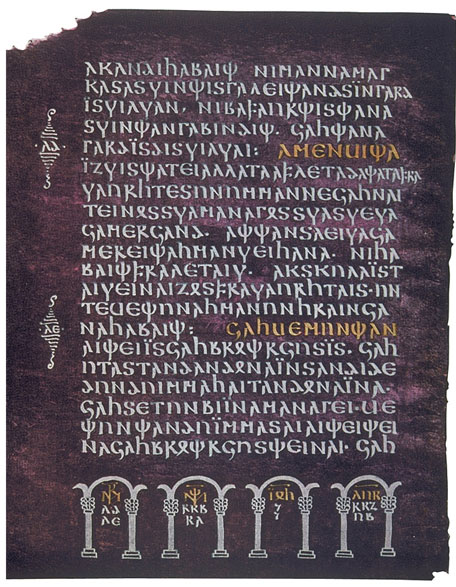The views expressed in our content reflect individual perspectives and do not represent the official views of the Baha'i Faith.
When I was a kid, I asked my Lutheran minister this question about a hundred times: “Who gave God his name?”
I never got an answer, either.
You can tell from the question that I thought God was a man. (Hey, give me a break—I was 6!) I knew my mother and father had given me my name at birth, so I wondered, truly and deeply, who could’ve possibly named God. In my childhood consciousness, this seemed to be a highly paradoxical and important question. I had to find out.
So, for those of you who’ve wondered the same thing, here’s the answer: the Germans named God. Actually, the word God comes from the proto-Germanic language, spoken long before Germany was ever a country, as far back as the Bronze Age. Proto-Germanic speakers, somewhere around 500 A.D., used the root word “gudan” to name the Creator, when they translated the Bible into the Gothic language. Gudan comes from the old proto-Indo-European ģhau, which means “to invoke” or “to call.” And, oh, by the way—those two words have no gender. As the church spread through Europe in the 5th and 6th centuries, the word God somehow became masculine, probably to help convert the pagans of the time.
[Amazingly, you can still see that actual Bible where God’s name originated, if you’re ever in Sweden. It’s called the Codex Argenteus (which means Silver Book, because of its silver ink), and some of its beautiful illuminated manuscript pages are displayed in the Carolina Rediviva library in Uppsala.]
So what did they call the Creator before the word God came along? Just about every culture had a different name for the Supreme Being: El in Hebrew; YHWH or Yahweh in Judaic societies(which means He Who Is); Allah, which simply means God in Arabic, and is used by Muslims as well as by Arabic-speaking Christians and Jews; Vishnu or Brahman in many Hindu cultures; Aten in prehistoric Egypt; Waheguru for the Sikhs; Ahura Mazda for the ancient Zoroastrians; the Great Spirit for many Native American tribal cultures.
Entire books and dissertations exist on the fascinating subject of the names of God, so I won’t belabor the point in this short essay. Instead, let’s look at these two short, illuminating quotes from the Baha’i writings, which explain the relationship of the many names of God to the human perfections, attributes and qualities exemplified by the messengers and prophets of God’s great Faiths:
God is eternal and ancient; not a new God. His sovereignty is of old, not recent; not merely existent these five or six thousand years. This infinite universe is from everlasting. The sovereignty, power, names and attributes of God are eternal, ancient. His names presuppose creation and predicate His existence and will. We say God is creator. This name creator appears when we connote creation. We say God is the provider. This name presupposes and proves the existence of the provided. God is love. This name proves the existence of the beloved. In the same way God is mercy, God is justice, God is life… – Abdu’l-Baha, Foundations of World Unity, p. 101.
Nevertheless, we speak of the names and attributes of the Divine Reality, and we praise Him by attributing to Him sight, hearing, power, life and knowledge. We affirm these names and attributes, not to prove the perfections of God, but to deny that He is capable of imperfections. When we look at the existing world, we see that ignorance is imperfection and knowledge is perfection; therefore, we say that the sanctified Essence of God is wisdom. Weakness is imperfection, and power is perfection; consequently, we say that the sanctified Essence of God is the acme of power. It is not that we can comprehend His knowledge, His sight, His power and life, for it is beyond our comprehension; for the essential names and attributes of God are identical with His Essence, and His Essence is above all comprehension. – Abdu’l-Baha, Some Answered Questions, p. 148.
For Baha’is, the names of God reflect the divine attributes the prophets demonstrate—and developing those heavenly qualities becomes the goal of all human life.
Baha’is understand that we mortals can never understand the reality of God:
Praise be to God, the All-Possessing, the King of incomparable glory, a praise which is immeasurably above the understanding of all created things, and is exalted beyond the grasp of the minds of men. None else besides Him hath ever been able to sing adequately His praise, nor will any man succeed at any time in describing the full measure of His glory. Who is it that can claim to have attained the heights of His exalted Essence, and what mind can measure the depths of His unfathomable mystery? – Baha’u’llah, Gleanings from the Writings of Baha’u’llah, p. 60.
But Baha’is also understand that every human being can aspire to transform our lives by acquiring the divine attributes true religion exemplifies.


















Comments
Sign in or create an account
Continue with Facebookor